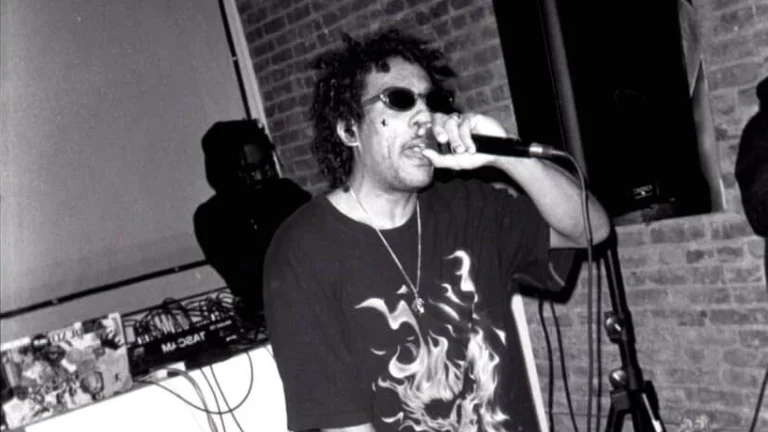From climate changes to political instability to inequalities—everyone is tired. However, not everyone can make art from an epidemic of doomerism without sounding vain or redundant. Somehow, Angelo Mota takes on universal plights, churns them through an orb of his own experiences, and ousts them in a way that is dismally his and easily relatable. The singer/rapper from West Orange, New Jersey, possesses it all: lyrical finesse, animal magnetism, and producer virtuosity making his talent undeniably arresting. His latest album, angelo is tired, showcases a rare ability to turn everyday struggles into immersive soundscapes, blending a unique production tone with a lyrical depth that feels intimate and profoundly human.
Kicking off with something of a hollow tribal chant, the intro, “fed up,” leaps into a belligerent mood. Mota raps about an inclination to self-destruct and follows up with a marchbeat call-and-response style evocative of Afrika Bambaataa and its modern pop consumption by the likes of Travis Scott. In a chopper rap style, he sweeps across cultural commentary and personal matters. Mota describes his frustrations with everything, from career pressure to existential paranoia. “Way too brittle, won’t someone fight for me,” he pleads and contradicts with, “I got hands I been tryna throw with my author,” mirroring the fast-paced element of life he posits with: “Life keep running while I tell it walk slowly.” The central message: Angelo Mota is tired, all right.
“But we cannot simply sit and stare at our wounds forever,” 21st-century writer Haruki Murakami wrote, and on the next track, “damn, i know,” the artist takes a break from bemoaning life’s woes to appreciate the better things of life. No, it’s not nature, but women and sex. “Put the rest of my day on hold,” he raps the metaphorical caesura. With “damn, i know,” Angelo has the complete punk-trap starter pack: gritty guitar strumming, booming 808s for a bass-heavy low-end, the punchy kicks, and sharp snares of trap percussion alongside repetitive bars. The result: a playful, energetic production that creates an intoxicating rave that will have even the most impervious listener concussed from head-bobbing too hard.
But the theme of variance soon reemerges as the cook-a-hoop nature of “damn, i know” gives way to subtle pessimism on “all good.” In East Coast hip-hop’s boom-bap, swinging style, the beat is high-energy, snares snappy, and synths rise and fall with anticipatory tempo, all merging into a frantic pace. It’s a song you can imagine being used in street fights, gang members agitating loudly from the crowd. Here, Mota is geared up and again ready to throw hands against fate. Like Sisyphus, he pushes up the hill: “All kings either get rings or beheaded.” He realizes that he, unlike the cursed tyrant, has a choice in life: to wallow in his vexations or “rise to the summit.” While it would seem that the songs are thematic deviations—especially with the opener reinforcing the subject of despair—Mota, by choosing to look to the bright side, becomes a beacon of positive rebellion. His gospel in optimism recreates that fight scene, only instead of rival gang members, he beats down his demons.
The next song serves as a crucial point in the album, shifting Mota’s focus from outward defiance to self-reflection. It bridges the album’s aggressive start with the delicate vulnerability that follows in the second half. In “four four four,” a one-minute low-fi tune with dark vocal layering harmonizing in the backbeat of bluesy piano notes, the rapper is all about “sweating out the evil through the pores” because “don’t you know you always had a choice.” This urgency for self-preservation and governance pervades the rap: “Bunch of multi-millionaire made men / Telling me where I should put the hi-hat.”
This journey from self-assured independence to emotional rawness proves Angelo’s depth, as he transitions to confronting the messiness of love and heartbreak. “still ain’t you” has all the sensibilities of an R&B track, subtly infusing an Afrocentric vibe with a breakbeat drum rhythm and funky synths. He presents a softer image of himself as the struggling romantic, dissecting the incompatibility and carcass of a romance he can’t seem to let go of. Angelo breaches the subject of heartbreak with the awareness that anger is easy, and so is frustration (both emotions he’s proven to fight against)—but heartbreak that lends itself to grief is a feeling he doesn’t know “what the fuck to call it,” the one arrow that penetrates his bulletproof armor.
But Mota prides himself on his capability to bounce back from anything, and in “end times,” he has more to fret over than lost love. On this track, he features leroy, with whom he made the 2021 joint album ZAÏRE, and North Carolina rapper Mez, who’s collaborated with Dr. Dre and Kanye West. Rapping over a minimalist blend of synths and a moderate-paced 808 swing, the album comes full circle. Only instead of the exasperated tone on the intro track, Mota addresses this impending desolation in a laid-back manner, not out of submission but passivity, as he remains socially aware, acknowledging the encircling gloom but refusing to be affected by it.
The somber mood extends into the final track “animal.” Mota stuns with his vocal flair on this track, which begins with a denouement texture—dreamy, atmospheric synths setting an epic, cinematic ambiance. But soon the beat drops, interspersing pop elements with a sparse drum beat that, unlike the other tracks, allows room for other instrumentals to shine. Mota is apparently saying—beginning the album with a cacophony of torments and ending it with just one—it all comes down to a single thing at the end of the day: Love. “Knowing you left me on the ground / Is a hard pill to swallow,” he croons. After an album-long era of stoicism, he admits that to be strong, too, is to “Let the tears flow.” At last, the final stage of grief: a much-needed catharsis.
In angelo is tired, Mota transcends his typical role as a social critic, crafting an album that speaks to the struggle and resilience of the human spirit. From the opening track filled with aggression and existential despair to the reflective moments of vulnerability and self-awareness, he paints vividly the complexities of modern life. His ability to balance a gritty persona with raw emotion only reinforces his position as a standout artist in today’s landscape.





